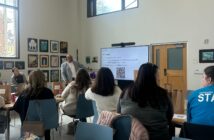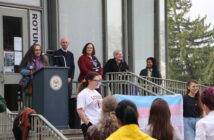
Gaby Morera
How much do you know about Puerto Rico?
If all you know is that we speak Spanish and have Zika virus, you should really ask yourself where you’ve been for the past 118 years in which Puerto Rico has been a part of the U.S.
The U.S. “acquired” — and I use the term with reluctance since we had already been freed from Spain when the U.S. decided to step in and “liberate us” — at the end of the Spanish-American War in 1898. The rest, as they say, is history — or at least it should have been. But, here we are still under U.S. rule with our “liberation” nowhere in sight.
Some scholars have called Puerto Rico the last colony, and it’s not hard to see why. For more than a century, the U.S. government has enacted laws concerning Puerto Rico when it benefits them with no regard to the wants or needs of the island inhabitants.
In 1917, the U.S. government passed the Jones Act and declared Puerto Ricans U.S. citizens just in time to draft them into the army for the end of World War I. But, we weren’t allowed to elect our own governor until 1957, and to this day can’t vote for the president of the United States unless we become residents of a state.
We get one representative in the House of Representatives who can speak but can’t vote, even though our population is larger than 22 U.S. states.
It feels like a political and geographical limbo. Some rules apply to us but others do not.
It gets even more confusing when you talk about our culture. Our official language is Spanish and our culture is distinct from the United States — it resembles Latin American culture much more closely. Yet, we’re considered U.S. citizens and some Latin Americans say we’re “Americanized.”
So where does Puerto Rico stand?
It’s important for Americans, especially during this election season, to know what happens in their country, but Puerto Rico is a scarcely talked about issue. Around 3.8 million people live on the island, yet they don’t get to have a say in the elections. The fact that 3.8 million American citizens are represented by one person who can’t even vote on their behalf is just frustrating.
U.S. congress recently passed a bill, called the PROMESA act, that appointed a fiscal board to Puerto Rico so that it can oversee our finances and try to get us out of our fiscal crisis. Yet this action takes away the little power that Puerto Rico holds over its citizens and was enacted by representatives from all 50 states, but had no votes from a Puerto Rican elected official.
Our governor, Alejandro García Padilla, was a supporter of the legislation, but even he said it takes away some of our nation’s power in an op-ed.
“PROMESA is a mixed bag,” he wrote. “On the one hand, it provides the tools needed to protect the people of Puerto Rico from disorderly actions taken by the creditors. On the other hand, PROMESA has its downsides. It creates an oversight board that unnecessarily undercuts the democratic institution of the Commonwealth of Puerto Rico. But facing the upsides and downsides of the bill, it gives Puerto Rico no true choice at this point in time.”
If we were considered a colony before, this is like a flashback to the 1800s.
The problem is also that, historically, U.S. and Puerto Rico relations haven’t been the best.
Whenever something bad happens, like our fiscal crisis, it’s on us and it was our country’s fault. Yet, we win our first Olympic gold medal and some Americans want to claim it as their own.
Some Puerto Ricans are even celebrated by Americans in the mainland.
For example, Hamilton creator Lin-Manuel Miranda has become a beloved figure after his Broadway success, and has always been vocal about being Puerto Rican. Other notable Puerto Ricans are Supreme Court Justice Sonia Sotomayor, Ricky Martin, J-Lo, Rita Moreno and MLB player Carlos Beltran — to name a few.
You can’t have it both ways. The U.S. either needs to claim responsibility for all of it — the good and the bad — or none of it and let us be free.
It’s obviously not that easy, especially considering the majority of people this affects don’t have a say in U.S. laws or elections at all.
With the elections coming up, it’s important for voters to be informed about candidates and their policies. But, voters also need to think about how their vote determines the fate of the many U.S. citizens living on U.S. territories who didn’t have a say in the elections.
Use your vote and your voice because some of us don’t have that privilege.
—
Gaby Morera, ’17, is a managing editor for The Brown and White and a native of Puerto Rico. She can be reached at gam217@lehigh.edu





Comment policy
Comments posted to The Brown and White website are reviewed by a moderator before being approved. Incendiary speech or harassing language, including comments targeted at individuals, may be deemed unacceptable and not published. Spam and other soliciting will also be declined.
The Brown and White also reserves the right to not publish entirely anonymous comments.